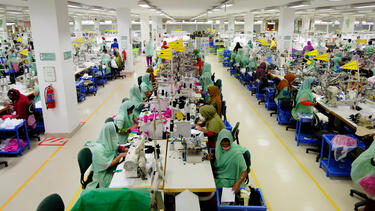Social Impact
The Funding Crisis Facing Nonprofits
We talked to Andrea Levere ’83 and Alexandra Sing ’20, CEO and COO of Capitalize Good, about the state of the social sector and the increased urgency of their work working with funders and nonprofits to move toward a model of stable, long-term capital.

Do we need more ecological intelligence?
Daniel Goleman, the author of the bestselling Emotional Intelligence, says that the growing field of industrial ecology can give us simple ways to evaluate the relative environmental impacts of consumer products
When is financial sustainability the wrong goal?
Should mission-driven nonprofits put money aside for a rainy day or spend what they have meeting the present needs of the people they serve?
Can the planet handle nine billion people?
Relentless population and economic growth is pressuring the systems that support human life. The head of a leading environmental advocacy organization talks about balancing ideals, such as the conservation of natural treasures, with the pragmatic steps and alliances necessary to get the planet on a sustainable path.
Where are the win-wins?
A step as simple as reducing the time that trucks idle can save money and cut emissions. An environmental advocacy group and a private equity firm have teamed up to uncover the sorts of efficiencies that further both of their missions.
What are the economics of happiness?
Economists have begun to use research into happiness to explore questions in economics, policy, and management. Betsey Stevenson of the Wharton School of the University of Pennsylvania surveys the work in this emerging field.
Can coffee help juice economic development?
A nonprofit is teaching business skills to East African farmers in order to let them enter the high-profit global market for specialty coffee. The project showed enough promise to get $50 million in underwriting from the Gates Foundation, and now aims to reach 180,000 growers. David Browning ’99 of Technoserve describes how to educate small-hold farmers to plug into the global market.
What is the for-profit social enterprise?
In a traditional model, for-profit companies strive to maximize returns for investors, while nonprofit organizations serve the public good. In recent years, a new model of for-profit social enterprise has emerged. Jon Carson '84, CEO of BiddingForGood, and Scott Griffith, CEO of Zipcar, bring their experience in the field to a discussion of the for-profit social enterprise ecosystem.
What do we owe the bottom billion?
Princeton philosopher Peter Singer has been a prominent, often controversial, figure. His utilitarian approach, focused on reducing suffering, has led him to argue for animal liberation and euthanasia. His most recent book, The Life You Can Save, looks at the responsibilities of individuals for addressing global poverty.
How does business value human rights?
As businesses have expanded beyond boundaries, they've exceeded the grasp of many national laws and norms. What standards should exist for how businesses affect people's lives? Christine Bader, advisor to the UN special representative of the secretary-general for business and human rights, discusses points of progress and remaining challenges.
How Has Globalization Benefited the Poor?
The lives of people in distant countries are increasingly being linked, through commerce, communications technology, or culture. Researchers are trying to parse out how the gains from globalization are touching the lives of the poorest citizens in developing countries.

